
What We Know So Far
- Zika, a virus transmitted by mosquitoes and linked to thousands of cases of birth defects, has been spreading across South and Central America at an alarming rate.
- There is no vaccine or cure.
- For most infected people, Zika symptoms are mild, if they appear at all. But pregnant women who are exposed seem to have a higher risk of having a child with microcephaly, or an abnormally small head.
- The WHO has declared Zika-linked microcephaly a global health emergency. But public health experts also caution that there is no definitive proof that the Zika virus is responsible for the birth defects.
- Colombia, Ecuador, El Salvador, and Jamaica have advised women to delay pregnancy.
- Brazil has warned pregnant women against attending the Rio Olympics, but the International Olympic Committee is downplaying dangers for most spectators, noting that the games will be held during Brazil's winter season, when mosquitoes are less of an issue.
Updates
CDC: Few Pregnant Travelers Have Zika
Few pregnant travelers screened for Zika were infected by the virus — only about 3% even in women with symptoms — U.S. health officials said on Friday.
From January to March, Zika virus tests were given to 4,500 U.S. travelers returning from Zika-afflicted regions, with more than 3,300 of them pregnant women. Only 28 pregnant women overall had Zika, said the CDC report. Most of them reported symptoms of the virus such as a purple rash, fever or red eyes. Only seven pregnant women lacking any symptoms were actually infected.
The report called the numbers reassuring, yet said that "health care providers should continue to offer testing to pregnant women with potential exposure to Zika virus, even if they do not have symptoms," because of the severe birth defect risks linked to the tropical virus.
Overall, 182 people out of more than 1,500 with symptoms turned out to be infected. Researchers are still assessing whether asymptomatic infection with Zika poses less of a birth defect risk.
CDC: Zika Definitely Causes Microcephaly
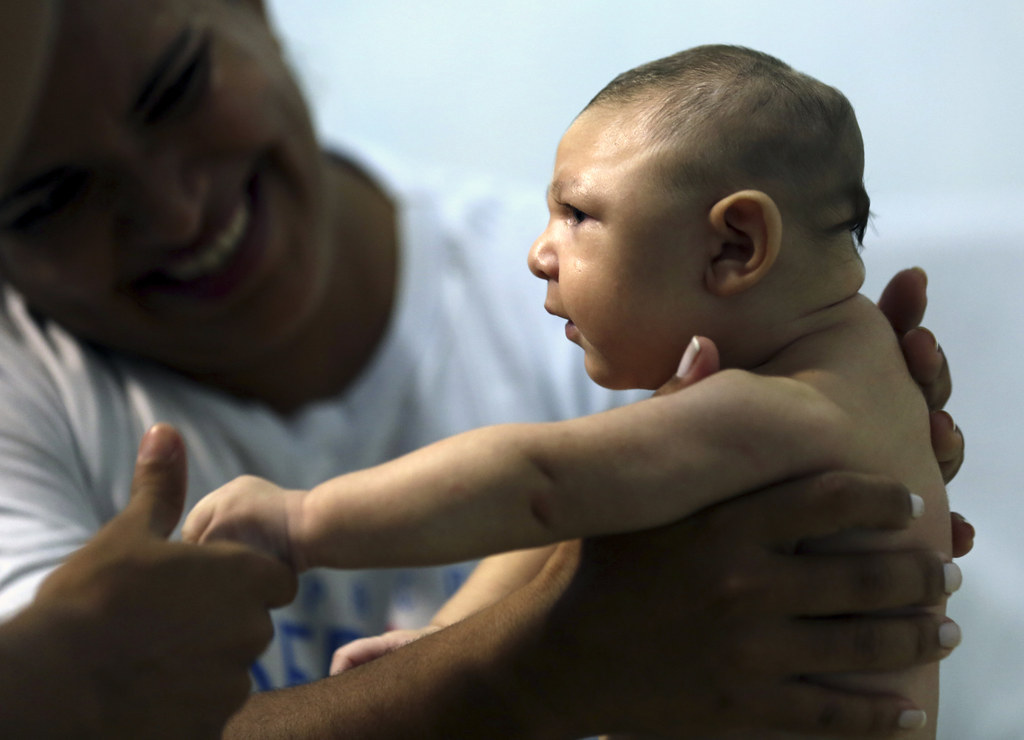
Zika virus definitely causes microcephaly and other brain birth defects, federal health officials declared on Wednesday, calling for heightened vigilance against the disease for pregnant and fertile women.
"Our hope is now we can be more definitive in communicating that Zika causes birth defects in babies, so that people take our health messages more seriously" said Sonja Rasmussen of the U.S. Centers for Disease Control and Prevention during a telephone briefing for reporters.
In October, Brazilian health officials raised alarm over sharp increases in cases of microcephaly, a severely shrunken brain and skull birth defect, and are now investigating thousands of suspected cases. The mosquito-borne and sexually-transmitted virus has spread to 33 countries and territories in the Americas in the last year, according to the World Health Organization.
In a New England Journal of Medicine report, Rasmussen and her colleagues compared published studies in Zika-infected fetuses and microcephalic children against scientific criteria for declaring a definitive link between a disease and a birth defect. The rarity of the severe form of microcephaly — termed "fetal brain disruption syndrome" — seen in infected infants seals the connection, they concluded.
World Health Organization chief Margaret Chan had declared a strong suspicion of a link earlier this year after declaring a public health emergency over the birth defects, but researchers had kept the possibility of some other culprit open in recent months.
Now, "there is no longer any doubt that Zika causes microcephaly," said CDC chief Thomas Frieden, at the briefing.
"We don't have all the answers," Rasmussen cautioned at the briefing. Estimates of the risk of a birth defect range from 1% to 30% in a pregnant woman infected by Zika, for example, a range that researchers would like to better define.
"Not every pregnant woman infected with Zika results in birth defects," she said.
Zika Arrived In Brazil In 2013, A Year Before The Outbreak
Air travelers may have delivered Zika to Brazil in 2013, genetics researchers suggested on Thursday, well before the 2014 World Cup soccer tournament that is sometimes blamed for the international spread of a virus tied to severe birth defects.
Over the past year, in the wake of the Brazilian outbreak, Zika has spread to 38 nations and territories. However, a new study in the journal Science that looked at genes from seven Brazilian victims of the virus — including a dead newborn with microcephaly — suggests Zika spent at least a year in Brazil undetected, apparently without triggering a burst of birth defects. The first surge of cases of microcephaly, a shrunken head and brain, did not appear until 2015, and have since grown to 863 cases and counting.
Read the whole story from Dan Vergano
CDC: Men Should Wait Six Months After A Zika Infection Before Attempting A Pregnancy
As many as 138,000 women in Puerto Rico face unintended pregnancies amid a Zika outbreak there, federal health officials warned on Friday, calling for increased access to contraception on the island.
"Pregnancy by itself is a risky situation," said U.S. Centers for Disease Control and Prevention official Denise Jamieson, speaking at a briefing for reporters. "Zika just adds another risk."
So far, 39 countries and regions are experiencing outbreaks of Zika virus, following a 2015 outbreak in northeastern Brazil. Since October, Brazil has linked 863 cases of microcephaly birth defects — a shrunken brain syndrome in infants — to infections with the virus during pregnancy. Although carried by mosquitoes, the virus is also sexually transmitted. There are six U.S. cases confirmed.
As part of the Friday announcement, CDC made its first recommendations for the time limits that couples should wait before attempting a pregnancy after an active Zika infection, marked by rash, fever and headaches: Women should wait eight weeks after the onset of symptoms, while men should wait longer — six months — before having unprotected sex and attempting conception. That's because the virus takes longer to clear from semen than the bloodstream after an infection.
Because Zika virus most often infects people without symptoms — perhaps 80% of the time — the CDC also counsels men and women who have visited Zika-affected regions to avoid unprotected sex or attempting pregnancy for eight weeks after their travel. The recommendation covers vaginal, anal and oral sex for all genders to prevent infection.
"CDC is learning more about Zika every day," Jamiesen said, pointing out the recommendations remain interim ones for now. The health agency based them on the longest observed linger times for the virus in blood and semen, and then multiplied those numbers by three to make its recommendations.
The agency still recommends that men who have been infected by Zika with pregnant partners either abstain from sex or use a condom for the duration of the pregnancy. —Dan Vergano
WHO Predicts 2,500 Cases Of Microcephaly In Brazil
Brazil may eventually suffer more than 2,500 cases of microcephaly tied to the Zika virus outbreak, World Health Organization chief Margaret Chan said on Tuesday, with cases now confirmed in Panama and more under investigation in Columbia.
"The more we know [about Zika], the worse things look," Chan said at a briefing in Geneva, Switzerland. "In less than a year, the status of Zika has changed from a mild, medical curiosity to a disease with severe public health implications."
Since 2015, Brazil has confirmed 863 cases of microcephaly, a severe birth defect marked by shrunken skulls and brains, in about 39% of suspected cases that have been investigated so far. WHO expects that confirmation rate to continue, and to spread to the 38 countries and territories now part of the outbreak.
A pattern has emerged in the outbreak, Chan added, with a paralytic ailment called Guillain-Barre syndrome striking Zika victims within three weeks of the start of the virus arriving in a new region. "Detection of microcephaly and other fetal malformations come later, as pregnancies of infected women come to term."
So far 12 nations have reported these early cases of Guillain-Barre. Cabo Verde, an island nation off the northwest coast of Africa, also reported its first suspected case of microcephaly linked to Zika on Tuesday. Cases of spinal inflammation and meningitis-like brain symptoms have also been linked to the outbreak.
If the outbreak spreads beyond Latin America, and the birth defect pattern holds, "the world will face a severe public health crisis," Chan said. "The first explosive spread [of Zika] may be over before a vaccine is available."
[PHOTO] Today's media briefing with Dr Margaret Chan on #ZikaVirus
Zika Mosquito May Spread To New York And L.A. This Summer
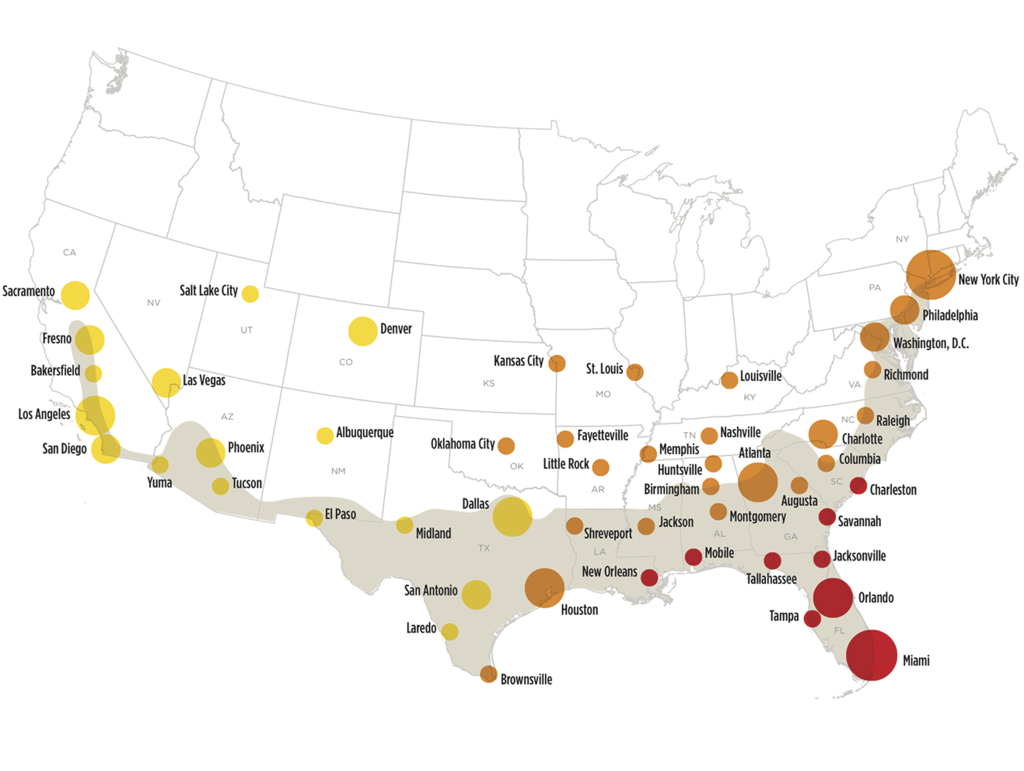
Summer months will see the kind of mosquitoes that carry Zika virus arrive in New York and Los Angeles, climate scientists estimated in a map released on Wednesday. (See high-res version here.)
Although U.S. winter temperatures are too cold for these Aedes aegypti mosquitoes outside south Florida and south Texas, summer temperatures should see them spreading north, according to researchers from the National Center for Atmospheric Research and NASA's Marshal Space Flight Center.
Read the whole story from Dan Vergano here.
Microcephaly Strikes 1 In 100 Pregnancies After Early Zika Infection, Study Finds
A Zika infection in the first trimester of pregnancy triggers microcephaly in about 1 in 100 births, suggests a study of the 2013 Zika outbreak in French Polynesia published on Tuesday.
Read the whole story from Dan Vergano here.
Genetically Modified Mosquitoes Gain Test Approval For Key West
The U.S. Food and Drug Administration gave approval on Friday to testing genetically altered mosquitoes on a Key West island, in a bid to cut risks of dengue and Zika virus.
The preliminary finding of "no significant impact" on human or animal health from an experimental release of the transgenic mosquitoes on Key Haven Florida, home to about 400 people, leaves 30 days for public comments.
The experimental mosquitoes, already tested in Brazil and Grand Cayman island, are all males that possess a "lethality" gene. Their release cuts mosquito numbers by passing the lethal gene to their offspring, who die unless they are fed tetracycline. Made by the biotech firm, Oxitec, the transgenic "OX513A" mosquitoes have been shown to cut numbers of wild Aedes aegypti mosquitoes that carry Zika and other diseases by around 82%.
"Oxitec will not conduct the field trial of its OX513A mosquito until the FDA has had the opportunity to review public comments," said the agency.
Some 155,000 people in Florida had previously signed a petition opposed to the experimental mosquitoes. However, last week, lawmakers at a hearing pushed the FDA to approve the insects' release immediately without public comment, something the agency said it would not like to set aside.
42% Of Americans Think Zika Is Fatal, Survey Finds
Even though the Zika virus is only very rarely fatal, 42% of Americans surveyed said it was "very likely" or "somewhat likely" to kill its victims, pollsters reported on Thursday.
The suggestion of widespread Zika misunderstanding comes months into the tropical virus leaping into public view, with the U.S. Centers for Disease Control and Prevention issuing travel advisories in January suggesting that pregnant women skip trips to outbreak regions.
People also aren't getting the message that the virus only rarely cause symptoms, the Annenberg Public Policy Center survey finds, with 44% thinking it does. In reality, only about 1 in 5 infections causes symptoms, typically a rash and fever.
That same portion of the people surveyed, 44%, mistakenly thought that the Aedes aegypti mosquito spreading the virus is found in all 50 U.S. states. Just over half say they are concerned about catching the virus. In reality, the mosquito is largely confined to Texas, Florida, and Gulf Coast states.
"Where is the misunderstanding coming from? We don't know yet," survey research director Ken Winneg of the Annenberg Center told BuzzFeed News. The survey team is analyzing where readers are learning about Zika to figure out the misunderstandings, collected in March 2 to March 7 phone queries, as part of a running series of surveys looking at news coverage of the outbreak.
About 68% of the 1,019 people surveyed say they are familiar with news reports about Zika. The survey results have a roughly 4% +/- margin of error in its reporting.
To Fight Zika, Feds To Pull Money From HIV And Flu Vaccine Research
Zika-fighting efforts threaten to drain funds needed to develop HIV and flu vaccines, prevent dengue, and monitor Lyme disease, federal officials said on Thursday, blaming a funding battle with Congress for the slowdown.
"We are going to have to slow down, or stop things," Anthony Fauci of the National Institutes for Allergies and Infectious Diseases (NIAID) said at a briefing for reporters.
The Obama administration and Congress are locked in a budget fight over $1.9 billion requested last month to pay for the federal response to the Zika outbreak.
Last month, House Appropriations committee member Chris Stewart of Utah unveiled a bill calling for federal health agencies to spend roughly $1.2 billion in remaining funds set aside to respond to 2014's Ebola outbreak on Zika instead, a position supported by the spending committee's leadership. The Senate has not acted on the Obama request, and Senator Roy Blunt of Missouri, a member of the Senate spending committee, last month questioned adding to the federal deficit by acceding to the Obama administration's Zika request, when Ebola funds remain unspent.
However Ebola, "is not over," Centers for Disease Control and Prevention chief Thomas Frieden testified at a hearing.
Both Fauci and Frieden pled for the Zika funding at the Wednesday briefing, which updated efforts to test insecticides in Puerto Rico and research on a Zika vaccine. Scientists working on a universal flu vaccine and respiratory virus vaccines, as well as a HIV vaccine, Fauci said, will have to be shifted to Zika virus vaccine efforts soon.
"No dengue work is going on right now," Frieden said, one example of work halted as CDC has turned its efforts to monitoring the Zika virus outbreak, now observed everywhere from Brazil to Mexico and throughout the Caribbean. Zika might infect "thousands" of pregnant women this summer, Frieden. "Time is of the essence."
In Puerto Rico, he added, the CDC is testing insecticides in 19 different location and finding some widely-used ones are ineffective against resistant Aedes aegypti mosquitoes that carry Zika virus. Mosquitoes have widely evolved resistance to many insecticides in a patchwork fashion, making finding the most effective ones essential before the rainy season in the Caribbean starts in the next few months.
"Puerto Rico remains a great place to visit, as long as you're not pregnant," Frieden said.
Zika Connected To Brain Swelling In Cruise Ship Patient
An elderly cruise ship passenger suffered dangerous brain swelling after a Zika infection, a French medical team reported on Wednesday, adding to suspicions the virus targets brain tissues.
Zika virus has been connected to cases of severe brain birth defects such as microcephaly in infants, as well as a paralytic ailment, Guillain-Barre Syndrome, in adults. The report of brain swelling in an 81-year-old man is a first report of the virus targeting the elderly.
In the New England Journal of Medicine report, researchers said the man arrived comatose at the hospital 10 days after a month-long cruise to New Caledonia, Vanuatu, the Solomon Islands, and New Zealand, paralyzed on his left side and in his right arm. Put on life support, he developed a distinctive rash over the next two days.
MRI scans revealed swelling of his brain and membranes covering his brain, a case of "meningoencephalitis" typically caused by bacterial or viral infections. A test of his spinal fluid came back negative for viruses or bacteria, however, except for Zika virus. All of the places his cruise had visited, except New Zealand, had reported Zika outbreaks within the last two years.
Case reports are typically seen by researchers as indications of areas where more research is needed, not the final word on the effects of a disease.
"Clinicians should be aware that [Zika virus] may be associated with meningoencephalitis," nevertheless, concluded the researchers led by Guillaume Carteaux of the Assistance Publique–Hôpitaux de Paris in Créteil.
The elderly patient recovered after two days on life support and discharged from the hospital 17 days later. He still has some weakness in his left arm.
Most Severe Birth Defects Tied To Zika Infection In First Trimester
Zika infections during the first trimester of pregnancy look particularly dangerous, U.S. health officials said on Tuesday, in a survey of severe birth defects in Brazil.
The U.S. Centers for Disease Control & Prevention weekly report concentrated on Pernambuco, Bahia, and Paraíba states in northeastern Brazil, where microcephaly reports skyrocketed last year. It looked at 574 cases of microcephaly, a severe birth defect marked by shrunken skulls and brains in infants, in those three states, where the Zika outbreak peaked from February to May last year.
In those states, the analysis correlated fever and rashes during those months as "consistent with Zika virus infection during the first trimester of pregnancy with the increased birth prevalence of microcephaly."
CDC directer Thomas Frieden suggested in February that Zika may do more damage during the first trimester to infants, similar to rubella. The overall microcephaly rate in 20 Brazilian states examined in the CDC report was 2.8 cases per 10,000 births, more than four times higher than the rate reported in Brazil before the outbreak.
Brazil is currently investigating thousands of suspected microcephaly cases, with 641 confirmed as being tied to a Zika infection overall. Cases of microcephaly tied to the mosquito-borne virus outbreak were reported in Colombia and in Rio de Janeiro, in southern Brazil, last week.
"Pregnant women should protect themselves from mosquito bites by wearing long sleeves and long pants, applying insect repellent, and when spending time indoors, ensure that rooms are protected by screens or mosquito nets," concludes the report.
World Health Organization chief Margaret Chan on Tuesday also suggested that sexual transmission of Zika virus may be more common than previously suspected, raising concern about its transmission early in pregnancy. The CDC has recommended that men use condoms during their female partner's entire pregnancy as a precaution.
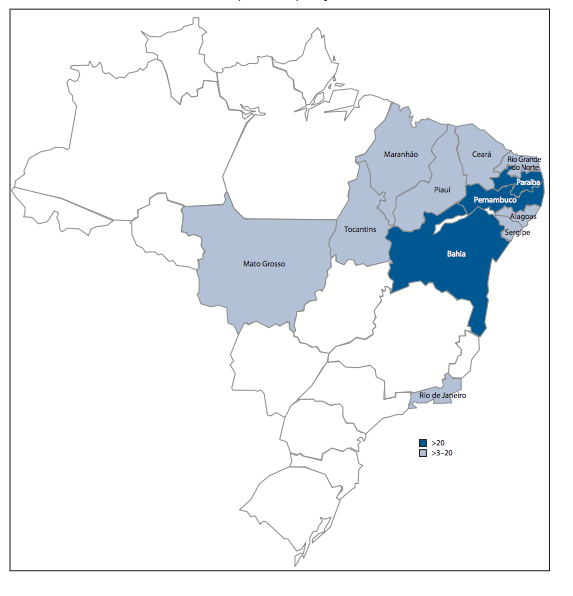
Study: 29% of Pregnant Women With Zika Passed On Birth Defects
A study of pregnant women in Rio de Janeiro adds to evidence that Zika virus triggers severe birth defects and miscarriages, an international team reported on Friday.
The New England Journal of Medicine study reports stillbirths, brain defects, and fluid accumulation in fetuses of the infected women. The study compared 42 infected pregnant women with 16 uninfected ones, who were otherwise healthy and lived in similar neighborhoods.
Examinations revealed birth defects, including microcephaly, in 29% of the infected women's fetuses. Similar testing found none among the uninfected women. "Despite mild clinical symptoms, [Zika virus] infection during pregnancy appears to be associated with grave outcomes," the study said.
Women infected during the first trimester of pregnancy had most of the birth defects, but one woman infected as late as her 27th week also had a fetus with central nervous system abnormalities. Microcephaly, the shrunken skull and brain birth defect seen in clusters during the Zika outbreak, was just one of a range of brain-tissue-related birth defects seen among the infected women. Two suffered stillbirths late in their pregnancy, and two identified early in the study miscarried before they could be examined by ultrasound.
"In the present scenario, over a period of a few months, we identified a fetal death rate of 4.8% — nearly twice the rate in an HIV-infected pregnant cohort followed for a decade — in addition to the serious fetal developmental problems," the physicians concluded. —Dan Vergano
Colombia Reports First Cases Of Zika-Related Birth Defects
Colombia's public health officials are reporting the country's first confirmed cases of birth defects — one case of microcephaly and two cases of severe brain abnormalities — tied to the arrival of Zika virus, a science journal reported on Friday.
"All three tested positive for the presence of Zika virus," according to the report in Nature. The diagnoses were made by the Colombian Collaborative Network on Zika (RECOLZIKA), established to monitor the effects of an outbreak that arrived in that nation in September.
Public health experts have warned that birth defects would likely start appearing in other nations as the Zika virus spread from northeastern Brazil. The Colombian birth defects might portend a wave that follows nine months behind the arrival of the virus. Zika has spread to 47 countries in the last year, according to World Health Organization officials.
Colombia and Brazil are monitoring birth defects with international assistance to help estimate the true risk of birth defects from a Zika infection during pregnancy, still a matter of conjecture at this point in the outbreak. —Dan Vergano
Google Gives UNICEF $1 Million For Zika Prevention
On Thursday, Google announced that it is granting UNICEF $1 million for its Zika-prevention efforts, as well as building a set of visualization tools to track potential outbreaks.
"A volunteer team of Google engineers, designers, and data scientists is helping UNICEF build a platform to process data from different sources (i.e., weather and travel patterns) in order to visualize potential outbreaks," the company said on its blog. "Ultimately, the goal of this open source platform is to identify the risk of Zika transmission for different regions and help UNICEF, governments and NGO's decide how and where to focus their time and resources."
The $1 million grant to UNICEF will go toward developing diagnostics and vaccines, as well as curbing the population of mosquitoes that transmit the Zika virus, the company said.
Rare Paralysis Syndrome Triggered By Zika Virus, Study Finds
The first wide-scale investigation of people who had Guillain-Barre syndrome during a recent Zika virus outbreak in French Polynesia finds compelling evidence that the infection triggers the dangerous paralytic ailment.
In February, the World Health Organization announced a public health emergency over the Zika virus outbreak in Brazil, citing clusters of severe birth defects as well as Guillain-Barre syndrome.
The new study, a head-to-head comparison of 42 people with the syndrome against healthy controls pubilshed in The Lancet, finds that all the Guillain-Barre patients had Zika infections, providing a strong statistical likelihood that the virus triggered their paralysis.
"Suffice to say Zika virus can be added to our list of viruses that can cause Guillain-Barre," wrote pathologists David Smith of the University of Western Australia and John Mackenzie of Curtin University in Bentley, Australia, in a commentary about the study.
All of the Guillain-Barre patients in the study, led by Van-Mai Cao-Lormeau of the Institut Louis Malarde in Tahiti, recovered from the syndrome that struck within days of their infections. There was no evidence of past dengue virus infections or other diseases that may have triggered Guillain-Barre.
The number of cases suggests that about 1 out of every 4,200 people infected by Zika develops Guillain-Barre, which can cause fatal respiratory paralysis if untreated. Whether that is more or less than other viruses is not clear.
"Guillain-Barre is something we see after many different infections, including West Nile Virus, which is related to Zika," CDC director Tom Frieden said on Friday at a Zika virus briefing. "We would not be the least bit surprised if Guillain-Barre is definitely associated with Zika."
The Zika virus outbreak has now spread to more than two dozen regions in the Americas, and as far north as Mexico, with more than 3 million people projected to be infected by the mosquito-borne virus in the next year. The Lancet study calls for increased intensive care beds across the Western Hemisphere to deal with increased numbers of Guillain-Barre patients as a result. —Dan Vergano
CDC Adds Sint Maarten, St. Vincent And The Grenadines To Travel Warning List
The Centers for Disease Control on Monday added two new destinations to its Zika travel warning list.
The virus has now been found on the Caribbean islands of Sint Maarten and St. Vincent and the Grenadines.
The CDC recommends pregnant women avoid traveling to areas where the virus is active; if they must travel, extreme protections should be undertaken against mosquitos. Sexual partners of pregnant women who have traveled to countries on the list should use condoms, the CDC said, and women trying to get pregnant should follow similar precautions.
Birth Defects, Miscarriages Seen In Pregnant U.S. Women With Zika
Nine U.S. women who were infected with the Zika virus while traveling to countries affected by an outbreak of the tropical disease suffered a range of pregnancy complications, including miscarriage and the birth defect microcephaly, federal health officials reported Friday.
Of the group of nine, two suffered miscarriages, two ended their pregnancies because of brain abnormalities, and one gave birth to a child with microcephaly. The four others were infected in their second or third trimester. Of those, two either gave birth to healthy children or are continuing their pregnancies. Read the full story by Dan Vergano.
Zika Linked To Stillborn Fetuses, One With Swollen Belly
An international medical team reported on Thursday that a stillborn fetus in Brazil was infected with Zika virus and had birth defects in the abdomen, never before connected to the disease.
The Zika virus has infected more than a million Brazilians in the last year, by official estimates, and has spread to more than two dozen countries. The World Health Organization in January declared a public health emergency over thousands of Brazilian infants born with microcephaly — a severe birth defect that causes a shrunken skull and brain — in the wake of the virus outbreak last year.
A team led by Manoel Sarno of Hospital Geral Roberto Santos in Bahia, Brazil, now reports the case of a 20-year-old pregnant woman whose stillborn fetus had not only microcephaly, but swollen pockets of fluid in the abdomen.
It's the eighth documented case in Brazil of miscarried fetuses or infants with microcephaly who died shortly after birth and had Zika virus in their brains. But only the new, eighth case showed birth defects outside the brain or nervous system.
Read the full story by Dan Vergano.
An On-The-Ground Look At The Company Using Mutant Mosquitoes To Combat Zika
Every weekday morning, Cecilia Kosmann releases mutant mosquitoes through the window of a van into the sleepy neighborhoods of Piracicaba, Brazil. The insects pass a lethal gene to their offspring, slashing the wild population's numbers.
Read the full story from Dan Vergano, reporting from Brazil.
Florida Reports Three Pregnant Women Infected By Zika Virus
Florida health officials report that three pregnant women from that state have Zika virus infections acquired while traveling to outbreak-affected regions.
"There have been no locally-acquired cases of Zika in Florida," according to Florida Surgeon General John Armstrong's report released on Wednesday.
The state now has reported 32 cases in total, with only three still displaying symptoms of the tropical disease linked to an epidemic of severe birth defects in Brazil.
Florida is home to the Aedes aegypti mosquito that transmits Zika virus to people, so infections there are of special concern. Health officials fear the virus will spread to wild mosquitoes that bite an infected traveler, leading to a Zika outbreak in the Sunshine State.
The state is coordinating with local and federal health officials to survey mosquito populations for signs of Zika virus. The U.S. Centers for Disease Control and Prevention recommends that pregnant women infected by Zika virus seek additional ultrasound testing to watch for signs of birth defects. —Dan Vergano
CDC Adds Trinidad And Tobago, Marshall Islands to Zika Warning List
The Centers for Disease Control on Tuesday warned travelers to take precautions against the Zika virus when visiting Trinidad and Tobago and the Marshall Islands.
Under the warning, pregnant women should consider postponing travel to the countries or take strict steps against mosquito bites. Male partners should use condoms or abstain from sex for the duration of the pregnancy.
The CDC has now issued travel notices for 34 countries and territories: Cape Verde, Aruba, Barbados, Bonaire, Curaçao, Dominican Republic, Guadeloupe, Haiti, Jamaica, Martinique, the Commonwealth of Puerto Rico, Saint Martin, U.S. Virgin Islands, Costa Rica, El Salvador, Guatemala, Honduras, Nicaragua, Panama, Mexico, American Samoa, Samoa, Tonga, Bolivia, Brazil, Colombia, Ecuador, French Guiana, Guyana, Paraguay, Suriname, and Venezuela.
14 New Cases Of Sexually Transmitted Zika In The U.S.
U.S. health agencies are investigating 14 new cases of Zika virus sexually transmitted from men to women, federal officials reported on Tuesday, "including several involving pregnant women."
The CDC warning says all of the cases involve men who had travelled to Zika-infected regions and had sex with the women within two weeks of their return.
Carried by mosquitoes, Zika has infected more than a million people in Brazil in the last year, and has been linked to an outbreak of severe birth defects there. Earlier this month, a Dallas health agency had reported a case of a woman who contracted Zika from a man who had returned from Venezuela. The 14 new U.S. cases "suggest sexual transmission may be a more likely means of transmission for Zika virus than previously considered," the CDC said.
According to the agency, only two of the new cases have been fully confirmed by lab tests in women who had no risk factors for Zika virus other than sexual contact with infected male travelers. "At this time, there is no evidence that women can transmit Zika virus to their sex partners," the CDC said, "however, more research is needed to understand this issue."
Mosquito-borne viruses are not usually associated with sexual transmission, biologist Erin Mordecai of Stanford University told BuzzFeed News. "We may want to take a look at other diseases because of what we are learning about Zika virus," she said.
CDC issuing a warning about sexual transmission of Zika indicates "pretty clear concern," Mordecai added.
The agency said that men who have travelled to Zika-affected regions should wear condoms during the pregnancy. Scientists do not know how long Zika persists in semen after an infection.
—Dan Vergano
UN Official Says Zika Virus Will Be "Way Down" Before Rio Olympics
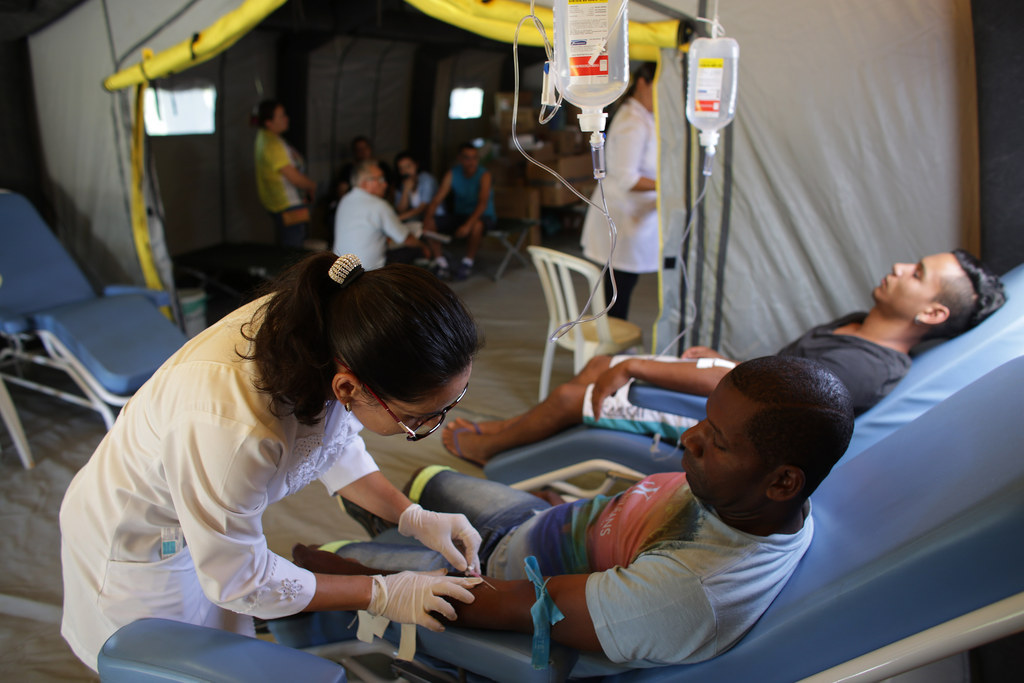
The head of the World Health Organization's Zika response team told reporters Friday that the mosquito-borne virus will be "way down" by the time the Summer Games begin in Rio de Janeiro on Aug. 5.
"Brazil is going to have a fantastic Olympics and it's going to be a successful Olympics and the world is going to go there," Bruce Aylward, WHO's executive director for outbreaks and health emergencies, said at a news conference.
According to the Associated Press, Aylward cited several factors in giving his assessment: For the southern hemisphere, August is actually winter, when mosquito activity decreases, making it easier for vector control officials. Also, by the time the Games come around, the Zika virus will likely have "gone through" a large slice of the country's population, meaning many may have developed an immunity to the disease.
World Health Organization Says It Needs $56 Million To Fight Zika Virus
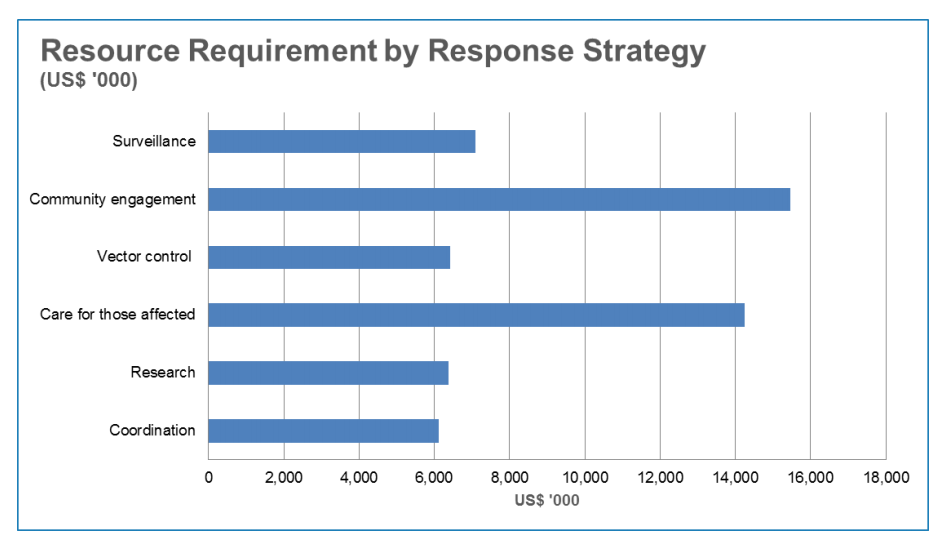
The World Health Organization has launched a 32-page plan to fight the spread of the Zika virus but says it needs $56 million to make it happen.
The Strategic Response Framework and Joint Operations Plan was released Wednesday and is intended to to guide the international response to the spread of the virus.
The WHO's main goal is to "investigate and respond to the cluster of microcephaly and other neurological complications that could be linked to Zika virus infection, while increasing preventive measures, communicating risks and providing care to those affected," the framework said.
Working with partners, the WHO is also mapping efforts to develop vaccines, therapies, diagnostic tests and putting in place plans to speed up data sharing, product development and clinical trials.
Part of the $56 million will come from the WHO's "recently established emergency contingency fund" which contains $2.3 million. The rest is expected to be raised through donor contributions.
Puerto Rico Reports First Locally Acquired Case of Zika
The Centers for Disease Control and Prevention announced on Friday that Zika appears to be spreading in Puerto Rico. So far, 27 cases have been confirmed, most near San Juan.
One infection happened in a person who was hospitalized for Guillain-Barre syndrome, an immune system disorder that may, in rare cases, lead to paralysis, and has been tentatively linked to Zika elsewhere. Another cases happened in a pregnant woman. No cases of microcephaly, the "shrunken head" birth defect that has been tied to Zika in Brazil, have been reported yet in Puerto Rico.
"Because the most common mosquito vector of Zika virus, Aedes aegypti, is present throughout Puerto Rico, Zika virus is expected to continue to spread throughout the island," the CDC said.
3 Zika Deaths In Venezuela
As the Zika virus spreads in an outbreak now hitting Venezuela, reports of deaths and serious illness underscore the often-mild disease's potential danger.
At least three Venezuelans have died from Zika infections and 68 have been hospitalized, Venezuelan President Nicolas Maduro said on Thursday, in an outbreak that spread from Brazil in November. Venezuela is monitoring pregnant women there for signs of the severe birth defects that accompanied the outbreak in Brazil.
Overall, more than a million Brazilians have been infected with Zika virus since the beginning of a May outbreak. Officially, about 5,000 Venezuelans have been infected in an outbreak there that began in November, although actual numbers are thought to be much higher. World Health Organization experts have estimated that 3 to 4 million people could suffer Zika infections in North and South American countries in the next year.
"It's a mistake to call it a mild disease," Zika expert Andrew Haddow of the United States Army Medical Research Institute for Infectious Diseases told BuzzFeed News.
Read more in this story by Dan Vergano.

Link Between Zika And Birth Defects Bolstered By New Research
The alarming uptick in babies born with shrunken heads is indeed linked to the Zika virus, according to a growing consensus of health experts. But many questions remain about how big the increase really is, how exactly the virus is transmitted from mother to child, and whether other viruses are also involved.
A New England Journal of Medicine report released on Wednesday describes a woman who was infected with Zika in 2015, during the first trimester of her pregnancy, in Brazil. Her fetus had severe microcephaly (an abnormally small head) and brain damage, leading her to request an abortion. The fetus was then examined with genetic and medical tests by researchers in Slovenia.
"The virus was present only in the brain tissue," study senior author Tatjana Avsic-Zupanc of the University of Ljubljana told BuzzFeed News by email.
The findings, which echo preliminary results in several other microcephalic fetuses and babies reported from Brazil last month, suggest that the Zika virus has a special affinity for attacking brain and nervous tissue, Avsic-Zupanc said. On Tuesday, another report concluded that babies born to mothers who had been infected with Zika are not only at risk of microcephaly, but optic nerve and eye damage.
Read more about Zika's mysterious link to microcephaly in this story by Dan Vergano and Karla Zabludovsky.

Obama Asks Congress For $1.8 Billion To Fight Zika Spread
President Obama on Monday asked Congress for $1.8 billion to fight the spread of the Zika virus across the Americas.
The money would go for mosquito control, training programs, and expanded laboratory capacity for vaccine testing.
At a press briefing, Dr. Anne Schuchat from the Centers for Disease Control (CDC) said it was important that the money be released quickly given the amount of international travel and the virus's continued spread.
"Time is really precious for this type of infection," she said.
The White House called for swift congressional action in order to "bolster our ability to reduce the potential for future infectious disease outbreaks."
Under the proposal, the Department of Health and Human Services would get $1.48 billion and $250 million would go toward aiding pregnant women in Puerto Rico, where the Zika virus has already started to spread.
There have been 50 laboratory-confirmed cases among U.S. travelers from December 2015 to Feb. 5, according to the CDC. The only recent case that has been transmitted within the U.S. occurred in Texas via sex.
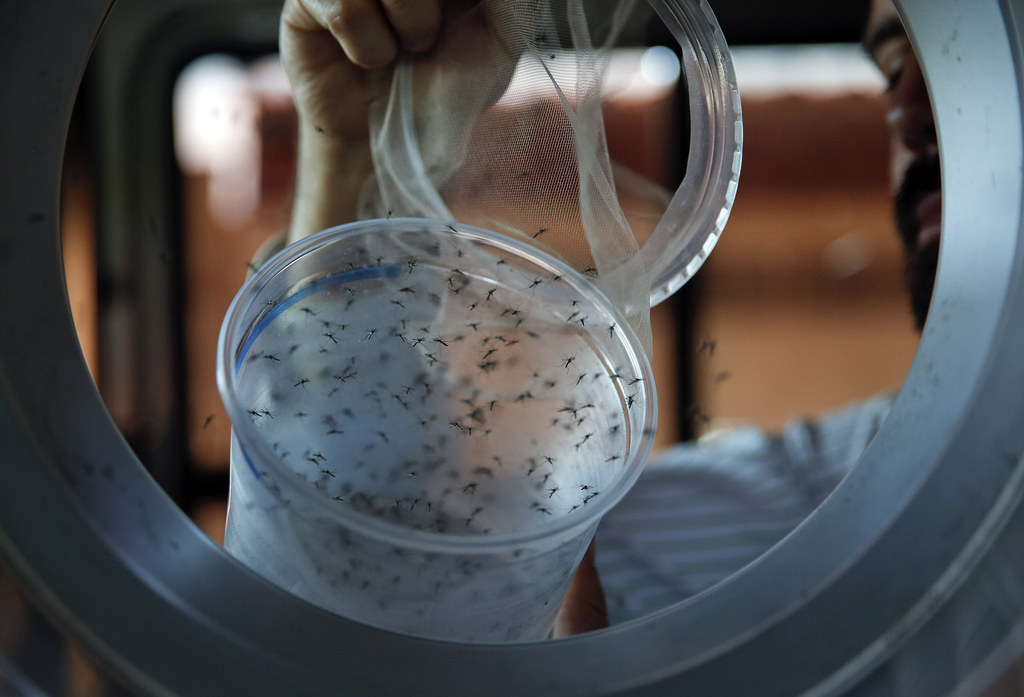
U.S. Olympic Athletes Told To Consider Not Going To Rio De Janeiro Over Zika Virus Concerns
The U.S. Olympic Committee has told athletes and staff that they should consider not attending the 2016 Games in Rio de Janeiro if they're concerned about the Zika virus, Reuters reported Monday.
The president of USA Fencing, Donald Anthony, told Reuters that Olympic Committee officials told leaders of U.S. sport federations in late January that no one should go to Brazil "if they don't feel comfortable going — bottom line."
In an email to BuzzFeed News, USOC spokesman Patrick Sandusky said officials were closely monitoring the Zika spread.
"We are closely monitoring the situation through the CDC and have ongoing contact with the International Olympic Committee, the organizing officials in Rio, the World Health Organization and infectious disease specialists with expertise in tropical diseases, including the Zika virus," he said. "Additionally, we're taking steps to ensure that our delegation and those affiliated with Team USA are aware of the CDC's recommendations regarding travel to Brazil."
CDC Warns About Sexual Transmission Of Zika
Men who have travelled to regions where Zika virus is established and have a pregnant partner should use a condom or abstain from sex with them, the U.S. Centers for Disease Control and Prevention recommended on Friday. No one knows how long the virus survives in semen.
The recommendation follows Dallas health officials reporting a woman infected through sexual transmission by a man who had caught Zika in Venezuela.
The CDC also suggested that pregnant women who have traveled to Zika regions get tested for the virus about two weeks after they return, symptoms or not.
Earlier CDC recommendations were for pregnant women to postpone travel to more than two dozen countries affected by the explosive Zika outbreak, which is linked to severe birth defects. Links between Zika and severe birth defects become stronger "with each passing day," Frieden said. —Dan Vergano

Brazil’s President Calls Zika Outbreak A “Real Threat”
Brazilian President Dilma Rousseff on Wednesday called for more efforts to eliminate mosquito breeding grounds to prevent the spread of the Zika virus, describing it as a "real threat" against the country.
In a taped message aired on Brazilian television, Rousseff said the government was mobilizing to develop a vaccine and vowed to protect women who have given birth to babies with microcephaly, a birth defect that causes abnormally small heads, affecting brain development, the Associated Press reported.
Researchers in Brazil have linked microcephaly to the Zika virus. But international health officials told the AP they have been hamstrung from doing their own research into the link, as well as potential treatment or vaccines, this despite the World Health Organization declaring the outbreak a global health emergency.
Read the whole story by Claudia Koerner here.
Florida Declares State Of Emergency In 5 Counties
Florida Gov. Rick Scott on Thursday declared a public health emergency in a fifth county after three additional people were diagnosed with the Zika virus.
In total, 12 people have been diagnosed with Zika in Miami-Dade, Hillsborough, Lee, Santa Rosa, and Broward counties, Scott said. All of them contracted the virus while they were traveling outside the U.S.
"With over 20 million residents and 100 million tourists, we must stay ahead of the possible spread of the Zika virus and take immediate action to ensure Florida is prepared," he said in a statement.
He also called on called on the Centers for Disease Control and Prevention to provide at least 1,000 antibody test kits, of which Florida only has 475. He also wanted federal officials to conduct a conference call with hospital workers within the next two weeks to endure they are prepared to properly treat patients.
CDC Adds Jamaica And Tonga To Its Travel Advisory List
The Centers for Disease Control on Wednesday warned pregnant women against traveling to Jamaica and Tonga, bringing its total list of countries and territories where the Zika virus has been actively transmitted to 30.
The CDC has recommended that pregnant women do not travel to areas where the virus is active. If travel is necessary, they should talk to their doctor and follow strict precautions against mosquitos.
Women trying to become pregnant should also follow precautions.
Zika Virus Could Spread Across Europe In Summer
The World Health Organization has released a statement warning that every European country in which Aedes mosquitos are present is at risk for the spread of the Zika virus.
A number of travelers infected with Zika have entered Europe, but the disease has not been transmitted further, as the mosquito is still inactive, Dr Zsuzsanna Jakab, WHO Regional Director for Europe, said in a statement.
"With the onset of spring and summer, the risk that Zika virus will spread increases," Dr Jakab said.
"Now is the time for countries to prepare themselves to reduce the risk to their populations. As there is no vaccine or treatment for Zika virus disease, we must protect the European region by stopping the disease at its source."
Dr Jakab urged European countries to control mosquito populations through insecticide spraying and killing of larvae, to inform pregnant women of the risks of mosquito bites, and to step up research into the virus.
Two Cases Of Zika Virus Detected In Ireland
Two unrelated adults have been found to have had Zika virus and since recovered in Ireland, public health officials confirmed.
The virus was detected retrospectively in the two adults who are both well now. Both individuals had a history of travel to Zika-affected countries.
In a statement the Health Service Executive said these were "the first cases of Zika virus infection confirmed in Ireland." Neither case is at risk of pregnancy.
"The finding of Zika cases in Ireland is not an unexpected event as many other European countries have reported cases as a result of travel to affected areas," the statement said.
"f you become ill within two weeks after your return to Ireland from an affected area, you should contact your doctor for assessment and let him/her know of your recent travel history to an affected area."
Last week, Public Health England warned men in the UK to wear condoms for a month after returning from any of the 23 countries affected by Zika, the Evening Standard reported.
Zika Disproportionately Affects The Poor — Here's Why
As Latin America wrestles with Zika, a relatively new virus in the region which is spread by mosquitoes and is believed to cause birth defects, the question is: does the scarcity that comes with poverty boost the odds of being infected?
"It's not an equal opportunity… it's depending on your social status, and where you live and what your means are," Janick F. Artiola, professor at the University of Arizona's Soil, Water and Environmental Science College of Agriculture and Life Sciences, told BuzzFeed News. Neighborhoods with running water are more likely to be spared infections, added Artiola. "It has to do with access to wealth and resources."
Read the whole story from Karla Zabludovsky
Here's Where Pregnant Women Should Avoid Traveling, According To The CDC
The U.S. CDC is warning pregnant women about traveling to 28 regions in Central and South America. (It's a "level 2" alert, meaning "practice enhanced precautions," as opposed to the more severe "level 3" alert to "avoid nonessential travel.")
The 28 regions are: American Samoa, Barbados, Bolivia, Brazil, Cape Verde, Colombia, Costa Rica, Curacao, Dominican Republic, El Salvador, Ecuador, French Guiana, Guadeloupe, Guatemala, Guyana, Haiti, Honduras, Martinique, Mexico, Nicaragua, Panama, Paraguay, Puerto Rico, Saint Martin, Samoa, Suriname, Venezuela, and the U.S. Virgin Islands.
First U.S. Zika Case Transmitted By Sex
Texas health officials on Tuesday reported a Zika virus case acquired by sexual transmission.
"The patient was infected with the virus after having sexual contact with an ill individual who returned from a country where Zika virus is present," said a Dallas County Health and Human Services statement.
The finding confirms that Zika can spread through sexual contact. Health official suggested that condoms be used to prevent sexual transmission from recent travelers to Zika regions.
The disease is largely spread through mosquitoes, but the confirmation of sexual transmission adds a new dimension to the outbreak.
Read the whole story from Dan Vergano.
Zika Vaccine Efforts Still Years Away
At least two approaches to a Zika vaccine are being studied, according to National Institute of Allergy and Infectious Diseases chief Anthony Fauci.
One would inoculate people with snippets of DNA copied from the virus, triggering an immune response that looked safe in a earlier, pilot vaccine effort for the related West Nile Virus. The other would be a more traditional vaccine reliant on a live but feeble version of the virus, similar to the original polio virus, an approach under study as a Dengue vaccine.
That still leaves the need for corporate partners to push a vaccine candidate to the market, where no partner could be found for the promising West Nile vaccine a decade ago.
Vaccines don't look like good investments to pharmaceutical firms in general, Nikos Vasilakis of the University of Texas Galveston Medical Branch told BuzzFeed News, because of their one-time use and development time likely extending past the height of an outbreak, offering little chance for a return on investment.
However, Fauci said that some corporate partners have expressed interest in a Zika vaccine. Indeed, French pharma company Sanofi Pasteur announced on Tuesday that it was launching a Zika program.
In the long run, biomedicine needs to come up with away to way to rapidly create vaccines effective against a broad spectrum of diseases, Fauci added, given the long line of infectious disease outbreaks of recent decades. —Dan Vergano
Brazil Warns Pregnant Women Against Attending Olympic Games Amid Zika Outbreak
Brazil will not call off the summer Olympic Games in Rio de Janeiro because of the Zika virus outbreak, but pregnant women should not travel to the event, the president's chief of staff said Monday.
"The risk, which I would say is serious, is for pregnant women," Jaques Wagner, chief of staff to President Dilma Rousseff, told reporters on Monday.
The Centers for Disease Control last month warned pregnant women from traveling to areas experiencing an outbreak of the virus.
Despite the warnings, Wagner said those who are not pregnant should not be afraid to attend the games when they go on as scheduled in August.
"We have to explain to those coming to Brazil, the athletes, that there is zero risk if you are not a pregnant woman," Wagner said.
Read the whole story from Claudia Koerner here.
Zika-Linked Birth Defects Declared A Global Health Emergency
The World Health Organization on Monday declared the birth defects linked to the Zika virus an international health emergency, with up to 4 million cases estimated for the Americas in the next year.
The tropical virus is spread by mosquitoes and scientists are investigating its link to an epidemic of birth defects in Brazil. The WHO had already warned that the virus will likely spread to every country in North and South America, except for Canada and Chile, where it is too cold.
The WHO has cautioned that while there was no definitive proof that the Zika virus is responsible for the birth defects, such as abnormally small heads, but Director-General Dr. Margaret Chan said last week that "the level of alarm is extremely high."
Read more about the WHO announcement here.
Jamaica Reports First Case Of Zika Virus
Jamaica reported its first confirmed case of Zika virus over the weekend.
The 4-year-old child initially developed symptoms in the middle of January and the Zika infection was confirmed on January 29. News stories citing Jamaica's health ministry claimed the child acquired the infection in Texas. But the ministry now says the "case is being investigated to determine the source of infection," including tests of Jamaican mosquitoes.
An outbreak of Zika has spread to 23 nations in the Americas in the last year, marked by a strongly suspected link to thousands of children born with microcephaly, an abnormally small brain and skull, in Brazil. Jamaica, along with Columbia and El Salvador, has recommended women avoid pregnancy in response.
"Based on case information available at this time, the evidence supports the fact that infection likely occurred in Jamaica and does not raise a concern for local transmission here," Carrie Williams of the Texas Department of State Health Services told BuzzFeed News by email.
If that is confirmed, it would mean the virus linked to an outbreak of severe birth defects in Brazil is being spread by mosquitoes in Jamaica.
In the U.S., there have been 31 cases of confirmed Zika infections, 6 of them in Texas, and all of them acquired by overseas travelers.
Jamaica's Ministry of Health originally planned a public briefing on Zika on Monday, but has postponed the event until Tuesday.
"Be Aware, Zika Is Near," says the ministry's website, advising pregnant women to take extra care to avoid mosquito bites. —Dan Vergano
